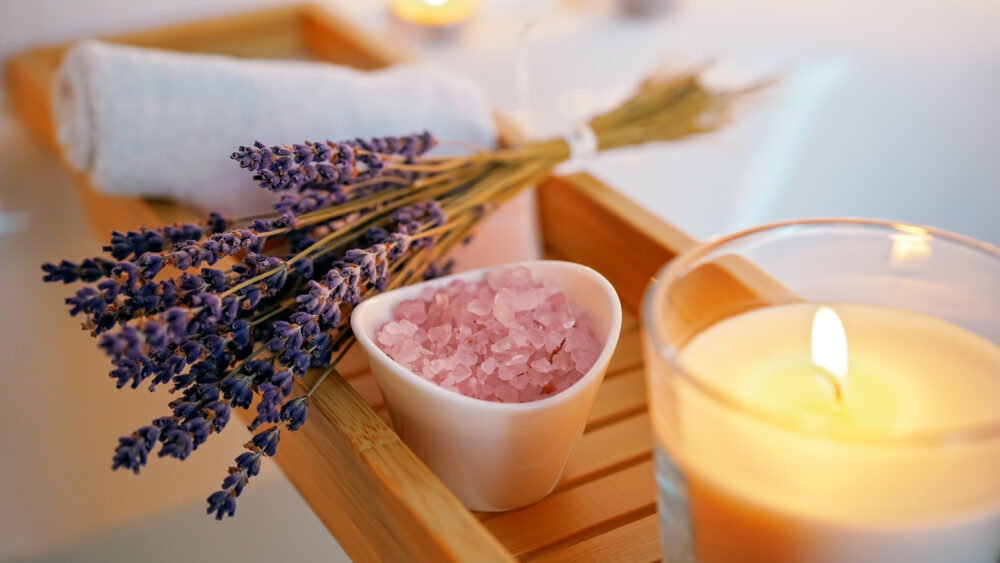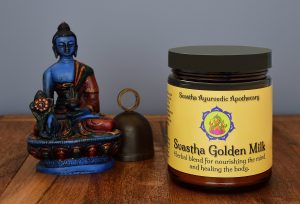 Just as it is essential to have a consistent and healthy routine for the daytime (known as Dinacharya in Ayurveda), it is equally essential for you to have a soothing nighttime routine to wind down and de-stress each night before bed. By welcoming calming activities in the evening, you are allowing your energy to ground and your mind to quiet. Any stress that has accumulated throughout your day can be processed and released, allowing you to sleep more deeply, longer, and more soundly. If you are among the growing number of individuals who are experiencing sleep issues, it may be helpful to make some positive changes in your nightly habits to establish sound sleep, each and every night!
Just as it is essential to have a consistent and healthy routine for the daytime (known as Dinacharya in Ayurveda), it is equally essential for you to have a soothing nighttime routine to wind down and de-stress each night before bed. By welcoming calming activities in the evening, you are allowing your energy to ground and your mind to quiet. Any stress that has accumulated throughout your day can be processed and released, allowing you to sleep more deeply, longer, and more soundly. If you are among the growing number of individuals who are experiencing sleep issues, it may be helpful to make some positive changes in your nightly habits to establish sound sleep, each and every night!
Sleep issues often stem from high Vata invading the nervous system and mind. This creates restless thinking, anxiety, fear, worry, loneliness, adrenaline surges (aka second wind), and an overactive nervous system; all of which can prevent you from falling asleep and staying asleep throughout the night. Since the Vata time of day is between 2 am and 6 am, many people often report waking up during this time and having a hard time falling back asleep. Of course, there may be other doshic involvements, such as an overactive Pitta type that works until all hours of the night. This excessive late-night thinking and problem-solving often lead to difficulty shutting off the mind, and therefore, sleep issues arise.
Although everybody’s causes and symptoms may look a bit different, performing some simple calming exercises before bed (consistently) should help a wide range of sleep issues. However, please keep in mind that how you go about your entire day will also affect your sleep patterns as well. Therefore, establishing a healthy daytime routine, a healthy diet, and a balanced mind will also be essential for creating healthy and consistent sleep patterns.
Before getting to the calming practices to add to your nighttime routine, I must mention that avoiding stimulating activities in the evening will be equally important. Here is a general, non-exhaustive list of some common activities for you to steer away from, ideally by 8 pm if not earlier.
Activities to Avoid After 8 pm
- Avoid staying up past 10 pm (this often leads to a second wind)
- Avoid bright lights in the house and blue lights on screens
- Avoid all work, including conversations about work
- Avoid heavy, serious, or upsetting conversations and arguments
- Avoid homework or school-related activities (studying, reading textbooks, etc)
- Avoid checking or answering emails
- Avoid computers, phones, and other stimulating electronics
- Avoid television or movies (especially scary or stimulating ones)
- If television is to be watched, make sure to watch it outside of your bed and perform some of the recommended calming activities afterward
- Avoid loud music
- Avoid exercise (a gentle, peaceful walk is alright)
- Avoid eating
- Avoid drinking too many fluids
- Avoid sleeping on the couch
So, keeping these in mind, here are some soothing practices to begin your healthy sleep routine. As with all Ayurvedic treatment programs, consistency is essential. Therefore, only doing these recommendations once in a while will not show you the effective and long-lasting benefits that you most likely desire. Of course, this is a long list with many suggestions; it is not intended for you to do everything each night. Rather, it is best to choose what is most needed on any given evening and perform 2 to 3 of these recommendations nightly.
Ayurvedic Nighttime Routine for Healthy Sleep
OVERALL RECOMMENDATIONS
- Finish a light dinner by 7 pm; avoid all food after
- Begin the wind-down phase by 8 pm (or earlier)
- Be in bed by 930 pm, asleep by 10 pm (or earlier)
1. Go for a peaceful walk.
Sometimes all you need to release stress is a calming evening walk to get some fresh air and gentle movement. If you do this after dinner, it also helps to digest your dinner meal, which will increase the health benefits even further. This can be done by yourself (best!), with a friend, or with a loved one. Just keep in mind to avoid electronics such as your phone and avoid heavy or excessive conversation.
Whether you are alone or with a friend, it is essential that you take some time to listen to the noises around you, inhale the fresh air (through your nose), take in your surroundings, and above all – be present! Make this your walking meditation and allow time for processing any disturbances throughout your day; however, avoid dwelling on anything in particular. Even if you only get a 10-minute walk in 2 to 3 nights a week, this is a great start!
2. Oil your feet before bed.
This is a simple, yet effective ritual that you will not want to go without! Taking a few minutes to massage each foot before bed is a great way to bring your energy downwards, calm your mind, and release tension from your body. As a bonus, my teacher, Dr Vasant Lad, has even stated that this practice indirectly works to encourage hair growth and prevent hair loss.
DIRECTIONS
This practice is best done either directly before bed or before the recommended restorative Yoga (if applicable). Ideally, you should use a calming herbal-infused massage oil such as Vata Oil, as infused herbs are absorbed into the soles of the feet, making this ritual much more effective. If this oil is unavailable, then coconut oil is great for Pitta types, and sesame oil for Vata and Kapha types.
Once you have your chosen oil, take a small amount and warm it slightly (optional, but recommended). Sit in a comfortable, quiet, and low-lit space. Apply a small nickel-sized amount to your right foot and massage each area thoroughly, making sure to give a bit more attention to any areas of soreness. Once finished, put on an old sock to encourage absorption and avoid getting oil on your bed or floor. Repeat on your left foot. **The socks only need to stay on for about 10 to 15 minutes, if you do not wish to sleep with them on.
Try our calming Vata Massage Oil!
3. Perform a full-body oil massage.
The full-body oil massage (aka Abhyanga) is a bit more time-consuming and effortful, but the calming effects that come with this ritual are well worth it! The skin is said to be the gateway to the nervous system. Therefore, performing a soothing oil massage with a calming medicated oil acts directly upon the nervous system, which is often imbalanced in sleep disorders. Since this method is more timely, it is recommended to perform at least once a week and perform recommendation #1 (see above) on the “off-nights”. However, if you are suffering from a severe or chronic sleep disorder, it is recommended to perform the oil massage 3 to 7 nights a week, especially in the beginning stages of healing.
Try our calming Vata Massage Oil!
Click here for full instructions for the Ayurvedic Oil Massage.
4. Take a warm ginger and baking soda bath.
The ginger and baking soda bath is a common Ayurvedic remedy that possesses many healing benefits. In this context, it is mainly recommended for its ability to calm the body, activate the Parasympathetic Nervous System (also called the “rest and digest” system), slow down the heart rate, alleviate anxiety, quiet a restless mind, relieve stress, and encourage a sleepy state.
DIRECTIONS
Begin to fill the bathtub with hot to warm water. Once the tub is filled about halfway, add in ½ cup of Ginger Bath Blend or ⅓ cup of dry ginger and ⅓ cup of baking soda. Mix the ingredients until they are thoroughly dissolved. Soak in the tub for at least 15 minutes or as long as needed.
Try our soothing Ginger Bath Blend!
FOR ADDITIONAL BENEFITS
- Add in some calming essential oils such as lavender, rosemary, rose, chamomile, and/or tulsi
- Play some calming music (I often use the “healing sounds” category on Pandora or hand pan music by Malte Martin)
- Turn off the lights and use some soothing candlelight instead
5. Drink a calming herbal tea.
Sipping on a soothing cup of herbal tea each night is a great way to induce a sleepy state in your body and mind. Not only will the herbs be effective for calming your overall energy, but over time (if done consistently), the very process of taking in this tea will spark a signal in the brain to tell yourself that it is time for sleep.
DIRECTIONS
Each night, about 45 to 60 minutes before your desired sleep time, make a cup of your favorite calming herbal tea blend. This is not recommended directly before bed, as this could cause your bladder to become overactive during the night. For more severe sleeping issues, try making a stronger infusion by starting with three cups of water and boiling it down to one cup over low heat (this requires planning ahead since it will take longer to prepare). Once the tea has cooled slightly, add a small amount of honey.
NOTES
- Replace half of the water with milk or almond milk during the steeping process to increase the soothing benefits even further.
- If you prefer, Golden Milk or Golden Almond Milk is a great option for inducing sleep and calmness, too!
Try our Sleepy Tea Kshirpak recipe.
6. Perform a few restorative Yoga postures.
This may be my favorite of the bunch – Restorative Yoga! This can be done in the privacy of your bedroom, and no Yoga experience is needed! The only props that you will need are some pillows and blankets. There are a handful of grounding postures to choose from, allowing you to do the poses you need on any given night. You can find many examples on YouTube, but here are my essential restorative poses for a calming nighttime routine:
- Supported Supta Badhakonasana (reclined butterfly pose)
- Supported forward fold
- Shavasana (corpse pose) – great for a lying meditation too!
- Legs up the wall
NOTES
- Restorative Yoga is all about gentle releasing, so avoid pushing into any posture and instead let all tension go and let gravity take you into the posture.
- Restorative is also about comfort! Use bolsters, blocks, pillows, and blankets for support, another blanket to keep warm, and an eye cover to induce a quiet mind.
- Each posture should be held for a minimum of 3 to 5 minutes.
**If time is short, just performing “legs up the wall” is a great compromise and still bestows many healing and calming benefits!
7. Perform a short meditation.
A short meditation is an excellent way to end the evening. It will help quiet your mind and calm your nervous system. Meditation is a great way to process the day’s stress and allow you to release any unnecessary tension and thoughts before bedtime. This can be done in a comfortable seated position, or you can perform the meditation in Shavasana (corpse pose). I would aim for a minimum of 10 minutes, although even 3 to 5 minutes is better than nothing. Since this should get you pretty drowsy, this should be the last thing you do for the evening.
Discover my favorite (and incredibly simple) meditation techniques here!
8. Take 10 deep belly breaths.
This is not only a quick and simple practice, but it can even be performed in the comfort of your own bed. Whether you choose to do this in a seated position, Shavasana (corpse pose), or in your bed, take just a few moments to quiet your mind and bring your attention to your breath. Take a long, slow, and steady inhale through your nose and bring it all the way down to your lower abdomen. Take a short pause (about one second), and then bring your exhale up and out of your nose. To make sure your inhale and your exhale are both elongated and equal in length, it is further recommended to internally count to five on your inhale and again on your exhale. Perform at least 10 breaths (or as many as needed). If time is available, you can follow this with the short meditation or restorative Yoga recommended above.
*This breathing practice can also be performed (in bed) if you wake up in the middle of the night and have a hard time falling back to sleep.
9. Discover your Mantra.
A mantra is a short group of words repeated internally or out loud to quiet the mind, increase concentration, and bring positive energy. It is considered a powerful tool for healing the subtle body and the nervous system.
In Hinduism, it is common to use short prayers written in Sanskrit such as “Om Gam Ganapataye Namaha”. If this resonates with you, I definitely recommend finding one that is meaningful to your needs; however, this mantra can also be a simple English saying if you prefer (see examples below).
No matter what you choose, take some time each night to repeat your mantra (quietly if out loud, or internally) 108 times using a mala (Buddhist-Hindu rosary), or simply just perform this for a set amount of minutes. This practice can be done in a comfortable seated position (recommended if chanting the mantra out loud), in Shavasana (corpse pose), or in bed.
Simple Mantras for Sleep (in Sanskrit and English):
- Om Gam Ganapataye Namaha
- Om Nama Shivaya
- Om Agasthi Shahina
- Sa Ta Na Ma
- So Ham (pronounced So Hum); inhale So, exhale Ham
- Aum (OM)
- I am peace
- I welcome in stillness
- I am tired, I will sleep
- May all beings be happy and healthy
- I inhale peace, I exhale stress
- I am not my anxiety, I am not my fear
- My mind is quiet, my heart is still
9. Read a pleasant book.
What better way to end the night than by cozying up to a nice book? Of course, it is helpful to choose a light, fluffy type of book while avoiding ones that require too much thinking, such as textbooks or informational writings. It is also important to avoid scary, thriller, action-packed, and/or suspenseful novels directly before bed.
If you’re like me, you may not get too far into the reading, but it is a really nice way to calm your excessive mind chatter and focus your energy on some fictional fun. I recommended avoiding bright lights, making a small book light essential. Since computer lights often stimulate the mind, it is not recommended to read electronic books at this time.
10. Take an herbal sleep aid.
Herbal sleep aids can be a great complement to these other recommendations. Although they may have a moderate effect on their own, they will be much more powerful and effective when used simultaneously with some calming nighttime practices. Here is a short list of some simple, non-habit-forming, and effective sleep aids that you can utilize for a peaceful night’s rest.
Ayurvedic Sleep Aids:
- Sleep Easy Tincture
- Nidra Nasya (nasal oil for sleep)
- Sleepy Tea (make using ½ part warm milk, ½ part water)
- Golden Milk (use milk or almond milk)
- Warm milk with Ashwagandha and Nutmeg
- Shankapushpi, Tagar, and Ashwagandha (add one teaspoon of this blend to hot water or warm milk)







this routine is so powerful and soothing
Hi Daisy,
I am so happy to hear you have found the routine to be helpful! These are all tools I enjoy using regularly myself.
Thank you so much for writing in!
Be well:)
Namaste,
Danielle
I can’t wait to do this routine. Thank you!
Hi Megan,
Thank you for taking the time to write in! I am happy to hear you are excited about the routine. I hope it helps keep you calm and well rested during these hectic times:)
Many blessings,
Danielle